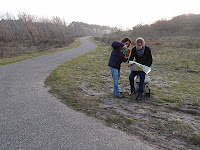
The route was new, but another thing remained the same. As usual we got lost on the way - despite iPhone and several maps.

And these were the questions we discussed:
You are doing fieldwork. In the field a lot is going on. You do not just find answers to your research question, as so much more is happening. Your informants may hope that you will help them. Or they may act in ways that make you feel uncomfortable. Bad things happen. What to do?
How to engage with nasty situations? How to do so, then and there, and how later, when you are writing? When do you stress them, highlight them, or when might it be wiser not to mention them?
If to you it seems best to write about "the bad", then how might this be done? On which platforms: social science journals, the newspaper, the web? In which tone: critical, with wonder, concerned? Who are you talking to: ‘the public’, the masters of capital or the guardians of the state, your informants, who else? And how does all of this relate to writing a PhD thesis, which is also doing an exam?














